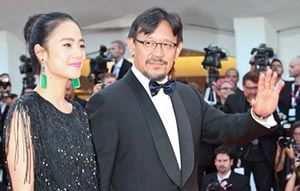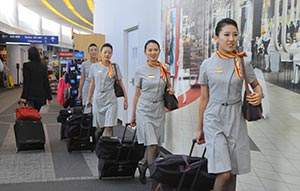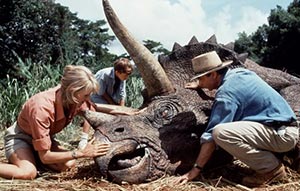

Yang says one popular model of cooperation in the film sector is co-production, where both parties contribute their expertise to the production process and share the risk of the investment.
Yang's comments are echoed by Meng Chao, 30, an independent film director, who says the production techniques and technologies of foreign companies are often appreciated by the Chinese film industry.
Meng says he believes a successful example is the California-headquartered Cameron Pace Group, which established a subsidiary in the port city of Tianjin to develop three-dimension film equipment and provide training for making 3D movies.
"One service the company's China subsidiary provides is a technology certificate system for 3D films that actually generates more market value for the company's existing technologies," Meng says.
In television, an increasingly popular method of cooperation is for Chinese companies to buy the Chinese production rights from a foreign reality show program, Yang says.
This cooperation model, Yang says, allows the Chinese partner to have the support from the foreign partner in the production process to keep quality consistent - and to learn from them.
One such example is The Voice of China, which is produced in the same format as The Voice of Holland, created by Talpa TV. Talpa TV subsequently sold the China production rights to Star Media and helped it produce a version for the Chinese audience in the same format and of the same quality as the original.
"The first series of The Voice of China was produced by Star in close cooperation with the Dutch executive producer Mark de Vink. For the second series our experts provided consultancy services," says Thomas Notermans, a spokesman for Talpa Holding.
"In our industry, know-how and quality of productions are much higher in Europe and the US than elsewhere. Since our market is small, we Dutch producers are very experienced in producing our formats abroad and keeping a good balance between the character of the original format and local (cultural) differences," Notermans says.
Another industry experiencing growing opportunities is publishing, because urbanization has increased people's average literacy levels and growing affluence has instilled in them a fascination for a wider range of topics, says Isa Wong, president of Pearson, Greater China.
"Urbanization is really drawing a lot more people into that reading population and creates a bigger size for the publishing industry to accommodate different interests in different areas," Wong says.
"With economic means improving, readers are exposed to a lot more things. International publishers can bring a different perspective, particularly for books such as travel, language learning, marketing, finance and management."
Pearson, which publishes mainly education books in China, already has 6,000 employees here. It sells tens of millions of books in China each year. Other international publishers actively expanding into China include Macmillan Publishers, Bertelsmann AG, and HarperCollins Publishers.
Tourism is also experiencing a growth, because urbanization increases people's curiosity of the outside world, says Dun Jidong, senior sales manager at the Chinese tourism operator Ctrip.com International Ltd.
"The lifestyle in rural areas is quite simple, but in cities people increasingly look for a more sophisticated lifestyle with more enjoyment. They want to experience the foreign lifestyle and try foreign food."
China's expenditure on travel abroad totaled $102 billion last year, the highest globally, United Nations World Tourism Organization statistics say.
Dun says that in the early days of international travel, packaged tours where five or eight countries are visited together were generally popular with the Chinese, because they saw such packages as economical in cost and time.
"As China urbanizes, people's demand for tourism becomes more sophisticated. More and more look for in-depth tours and increasingly they'd like to travel by themselves as opposed to with tour groups," Dun says.
Taking the Hong Kong market as an example, Dun says group tours that his company hosts only represent 10 percent of overall traveling.
"They are not there just to see Hong Kong, they want to spend their day properly with a relaxed mindset."
 Models at Ford pavilion at Chengdu Motor Show
Models at Ford pavilion at Chengdu Motor Show
 Brilliant future expected for Chinese cinema: interview
Brilliant future expected for Chinese cinema: interview
 Chang'an launches Eado XT at Chengdu Motor Show
Chang'an launches Eado XT at Chengdu Motor Show
 Hainan Airlines makes maiden flight to Chicago
Hainan Airlines makes maiden flight to Chicago
 Highlights of 2013 Chengdu Motor Show
Highlights of 2013 Chengdu Motor Show
 New Mercedes E-Class China debut at Chengdu Motor Show
New Mercedes E-Class China debut at Chengdu Motor Show
 'Jurassic Park 3D' remains atop Chinese box office
'Jurassic Park 3D' remains atop Chinese box office
 Beauty reveals secrets of fashion consultant
Beauty reveals secrets of fashion consultant